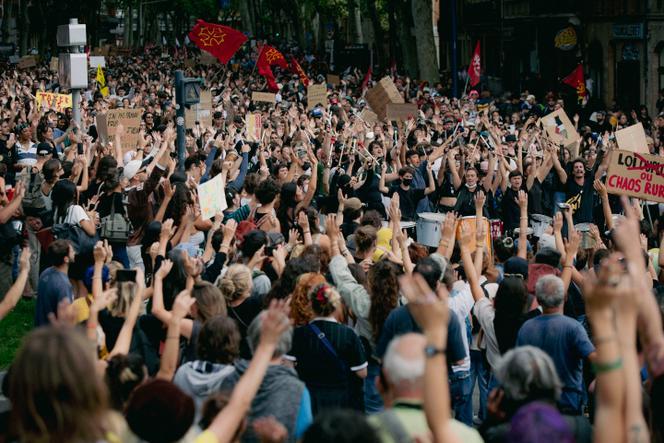France is witnessing a surge in nationwide protests as demonstrators adopt a new tactic known as “Block Everything,” bringing daily life to a standstill across major cities. This wave of unrest intensifies mounting pressure on President Emmanuel Macron’s government, challenging its policies and response strategies. The widespread blockades, involving transport hubs, factories, and public spaces, highlight deepening public discontent amid ongoing economic and social grievances. As the protests escalate, the administration faces growing demands for dialogue and reform.
Block Everything protests paralyze major cities in France disrupting daily life and commerce
The unprecedented wave of protests spreading across France has brought daily activities and commerce to a standstill in several major cities, including Paris, Lyon, and Marseille. Demonstrators have adopted a strategy of widespread blockades, targeting key transport hubs, highways, and commercial centers. This coordinated effort has severely affected public transportation, causing delays and cancellations that have left thousands stranded. Businesses are struggling as deliveries are halted and customers fail to reach stores, putting significant strain on the urban economy.
Authorities report the following disruptions nationwide:
- Over 50 blocked intersections resulting in traffic gridlocks
- Major train stations shuttered or operating at reduced capacity
- Ports and freight terminals experiencing critical delays
- Essential services, including hospitals, facing operational challenges
| City | Primary Disruption | Impact Level |
|---|---|---|
| Paris | Metro lines blocked, business closures | Severe |
| Lyon | Highway blockades, supply chain delays | High |
| Marseille | Port access restricted, dockworkers strike | Moderate |
Analysis of Macron’s response to escalating unrest and political fallout from nationwide strikes
President Emmanuel Macron’s response to the nationwide strikes, which have rapidly escalated into widespread “block everything” protests, has been marked by a combination of firm rhetoric and strategic concessions. While the French government has condemned the disruption caused by transportation shutdowns and public service halts, Macron has signaled a willingness to engage in dialogue with union leaders, aiming to de-escalate tensions without compromising on key reforms. This balancing act seeks to maintain his political credibility while addressing the mounting pressure from a populace disillusioned by rising living costs and pension changes.
Key elements of Macron’s response include:
- Public appeals for calm: Emphasizing the importance of social peace and warning against violence.
- Incremental policy adjustments: Offering limited modifications rather than full withdrawal of pension reforms.
- Security measures: Boosting police presence at strategic locations to contain protest-related disruptions.
- Political outreach: Convening cross-party talks to explore potential compromises.
| Response Strategy | Objective | Public Reaction |
|---|---|---|
| Firm rhetoric | Assert government authority | Mixed; seen as necessary by supporters, confrontational by opponents |
| Policy concessions | Reduce strike momentum | Viewed as insufficient by unions |
| Enhanced security | Maintain order | Criticized for heavy-handedness |
| Political dialogue | Find middle ground | Seen as positive but slow-moving |
Impact on the French economy and international supply chains as protests enter critical phase
The escalating protests have triggered widespread disruptions across key sectors of the French economy. Major transportation hubs, including ports and highways, remain paralyzed as demonstrators enforce blockades, severely impeding the flow of goods and raw materials. Retail chains and manufacturing plants report sharp declines in output due to interrupted supply lines and dwindling consumer footfall. Economic analysts warn that prolonged unrest could depress growth forecasts and amplify inflationary pressures already heightened by global market volatility.
Key repercussions for international supply chains include:
- Delayed shipments across the Eurozone, affecting just-in-time manufacturing industries in Germany, Italy, and Spain.
- Rerouting of freight traffic to alternative ports, inflating logistical costs and delivery times.
- Supply shortages of critical components, with the automotive and aerospace sectors experiencing acute bottlenecks.
| Sector | Impact Level | Projected Recovery Time |
|---|---|---|
| Transportation & Logistics | Severe | 4-6 weeks |
| Manufacturing | Moderate | 2-3 months |
| Retail | High | 1-2 months |
Strategies for government and unions to negotiate and de-escalate tensions amid growing public frustration
To effectively address the escalating tensions, both the government and unions must prioritize open lines of communication, fostering an environment where grievances can be aired without fear of reprisals. Establishing neutral platforms for dialogue that include community representatives, labor leaders, and policymakers can lay the groundwork for constructive negotiations. Additionally, swift and transparent sharing of data related to the economic and social impacts of the protests can build trust and reduce misinformation fueling public frustration.
Implementing phased de-escalation tactics is essential to avoid further violence and disruption. Key steps include:
- Temporary suspension of contentious policies to allow cooling-off periods.
- Joint task forces to monitor protest areas and prevent clashes.
- Public forums and town halls enabling direct citizen engagement with officials.
- Collaborative media engagement to promote balanced reporting and counteract provocative narratives.
| Strategy | Goal | Expected Outcome |
|---|---|---|
| Dialogue platforms | Open communication | Build mutual understanding |
| Policy suspension | Reduce tensions | Temporary calm |
| Joint monitoring | Prevent violence | Safe protest zones |
In Retrospect
As the “Block Everything” protests continue to sweep across France, the mounting disruptions underscore the deepening discontent with President Emmanuel Macron’s policies. With transport grids paralyzed and public frustration on the rise, the government faces increasing pressure to address the demands of its citizens. The unfolding events mark a critical juncture in France’s social and political landscape, with the outcome likely to have significant implications for Macron’s administration and the country’s future stability. NBC News will continue to monitor this developing story.




